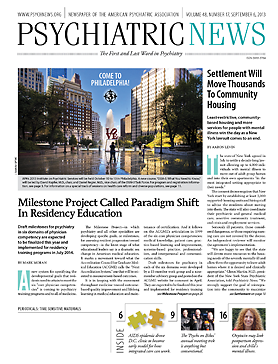The state of New York agreed in July to settle a decade-long lawsuit allowing up to 4,000 individuals with mental illness to move out of adult group homes and into their own apartments “in the most integrated setting appropriate to their needs.”
The consent decree requires that New York start by establishing at least 2,000 supported-housing units and hiring staff to advise the residents about moving into them. The state will also coordinate their psychiatric and general medical care, assertive community treatment, and crisis and employment services.
Seriously ill patients, those considered dangerous, or those requiring nursing care are not covered by the decree. An independent reviewer will monitor the agreement’s implementation.
“We are happy to see that the state will devote more resources to the housing needs of the severely mentally ill and allow them the opportunity to leave adult homes where it is desired and clinically appropriate,” Glenn Martin, M.D., president of the New York State Psychiatric Association, told Psychiatric News. “We strongly support the goal of reintegration into the community to maximize each person’s potential and believe it is fundamental to good care and outcome.”
“[The consent decree] demonstrates New York’s commitment to providing the best treatment possible for residents with mental illness and upholding the principles of the Supreme Court’s 1999 decision in Olmstead v. L.C.,” said New York Gov. Andrew Cuomo, in a statement.
The origins of the decree go back more than a decade, when the New York Times reported that for-profit group-home operators often provided poor care or ordered needless medical treatment for the residents.
The resulting legal case began in 2003, when Disability Advocates (now Disability Rights New York), the Bazelon Center for Mental Health Law, and other advocacy groups and law firms filed suit. They charged that New York state violated the Americans With Disabilities Act and other laws by segregating people with psychiatric disabilities in unsafe and unsanitary adult homes without community-based treatment and support, according to the Disability Rights New York website.
“This is a momentous decision,” said Sam Tsemberis, Ph.D., founder and CEO of Pathways to Housing, which developed the original housing-first model for those with mental illness. “It will give people with psychiatric disabilities a shot at a better life in the community.” Tsemberis served as an expert witness for the plaintiffs early in the lawsuit.
The case placed the state’s Office of Mental Health in a contradictory position, Tsemberis told Psychiatric News. Agency philosophy favored community settings. Yet, as part of the state government, it opposed the suit, possibly because undoing the existing system raised fears about the complexity and cost of change and triggered political pressure from owners of adult homes, he said.
Implementation will take some time, said Tsemberis.
“Living in independent apartments integrated into the community will be different from living in adult homes, and people will require substantial clinical and emotional support to make this transition, especially in the first few years,” he noted. “They are living in places where they are told everything to do, and now they will have to learn again and practice making their own decisions.”
Tsemberis suggested Housing First as a possible model. His organization arranges for no more than 10 percent of units within a given, privately owned building to be occupied by its clients and provides for a variety of off-site support and treatment services, whose staff members regularly visit them.
“This decision has enormous consequences because it will provide people with psychiatric disabilities the same access to housing, cultural, employment, educational, and social activities as the rest of us,” said Tsemberis. ■
